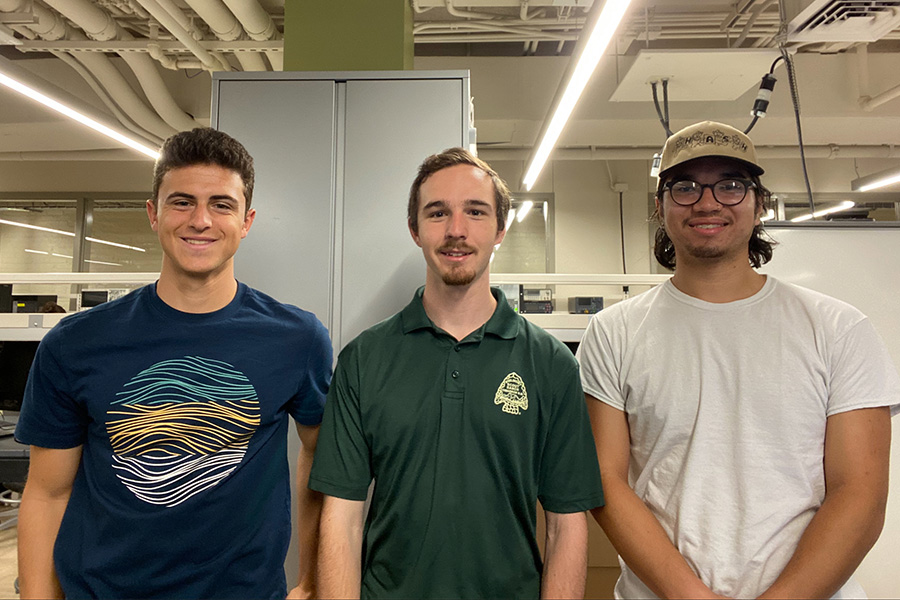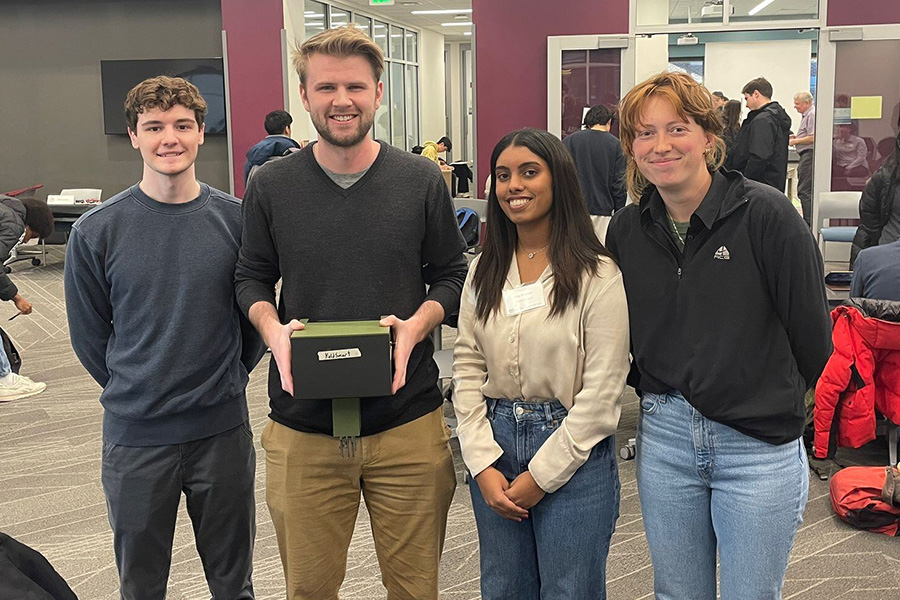Spark Challenge showcases innovation and collaboration of Purdue ECE students
The Elmore Family School of Electrical and Computer Engineering at Purdue University and the Electrical and Computer Engineering Student Society (ECESS) recently hosted the biannual Spark Challenge, an event that brings together students to showcase their creativity, technical expertise, and collaborative spirit. Spark is designed to inspire electrical and computer engineering students to think outside the box while applying their classroom knowledge to real-world problems. Students work in teams, combining their diverse skill sets to develop creative solutions and functional prototypes. The competition fosters not only technical growth but also essential skills in collaboration, communication, and problem-solving.
This year’s challenge featured projects that ranged from smart home technologies and sustainable energy solutions to applications in artificial intelligence and robotics. Teams were tasked with conceptualizing, designing, and presenting their projects to a panel of judges composed of faculty, alumni, and industry professionals.
The winning team, Purdubik’s Cube, aimed to create a visually impressive industrial automation demonstration by developing a machine capable of solving a Rubik’s Cube. The project showcases the capability of Kollmorgen's modern automation hardware through the development of a robot that autonomously solves a Rubik’s Cube. The project also features an interactive component where users can scramble a Bluetooth-enabled “Smart Cube,” with the robot mirroring each move in real time. This allows direct audience participation in scrambling the cube for the robot. This project highlights the integration of machine vision, advanced motor control, and optimized solving algorithms to create a visually engaging industrial automation demonstration.
Team members were: Junpei Ota, Aiden Hurd, Matthew Patrohay, and Brock Berta.

Last Resort GPS Tracker finished in second place. The device can be utilized to find the GPS location of multiple other devices and provide basic navigational information as well. It could be used to preserve remote areas such as United States national parks. Sometimes there is no cell service in these areas, which usually isn’t a problem, but if there ever is an emergency, people need a way to contact their other group mates if they are separated and if there is an emergency. To mitigate this risk, the team developed the Last Resort GPS tracker. The device gets your GPS location, transmits it over radio for peer-to-peer radio communications, and can also activate a loudspeaker on the other person’s device when in an emergency. The Last Resort GPS Tracker is small enough and light enough to fit within a backpack, and has an extended battery life of 24 hours, so that it can be left idle and listening for emergency signals for a long time.
Team members were: Calvin Given, Trent DeMesa, and Alexander Bowman.

Third place at the Spark Challenge went to YieldSmart. For generations, Indiana corn farmers have often depended on brokers or vendors for seed recommendations, frequently without knowing if the seeds were compatible with their soil conditions. This mismatch can result in lower crop yields and inefficient resource use. Our project, YieldSmart, addresses this challenge by introducing a portable, lightweight device equipped with pH, moisture, and NPK nutrient sensors to analyze soil composition. The device collects and stores soil data in an app, which leverages an AI system to recommend the most suitable corn seed varieties for specific soil conditions. In addition, YieldSmart provides tailored suggestions for irrigation techniques and fertilizer applications to enhance soil health. By automating soil analysis and employing AI for actionable insights, YieldSmart empowers farmers to make informed, data-driven decisions, boosting crop yields and promoting sustainable agricultural practices.
Team members were: Isha Shamim, Finn Corcoran, Riley Dickson, and Ari Zeiter.
A hallmark of the Spark Challenge is the active involvement of mentors and industry representatives, who provide guidance and real-world perspectives throughout the competition. Their expertise helped participants refine their ideas and navigate technical challenges, ensuring that the event served as both an educational experience and a stepping-stone for future innovation.
Industry sponsors also played a crucial role by offering insights into emerging trends and expectations in the professional world. Their presence underscored the importance of bridging the gap between academic learning and practical application, further enhancing the value of the Spark Challenge for participants.
The Spark Challenge embodies the mission of the Elmore Family School of Electrical and Computer Engineering to cultivate the next generation of engineering leaders. By providing students with opportunities to engage in hands-on, collaborative projects, the event reinforces Purdue's commitment to excellence in education and innovation.
Photos from the event can be found here.
